Activity Level: High
Hypoallergenic: No
Social Ability: Above Average
Skills: Hunting, Swimming, Tracking
Intelligence: Above Average
Ideal Climate: Temperate
The German Shorthaired Pointer (GSP) is a steadfast canine with boundless energy and limitless love. With an elegant stature and a friendly demeanor, a GSP is an exemplary companion, guardian, and furry best friend.
Breed Overview
 Origin: Believe it or not, the German Shorthaired Pointer actually originated in Germany. In the seventeenth century, hunters relied on trained canines to help them find mammals and birds in the wild. These breeds may have included Spanish Pointers and German Bird Dogs, which may be ancestors of the GSP. In search of a more versatile dog who could help hunt on land and water, breeding practices began aiming for a larger dog with wider jaws for snatching big game, webbed toes for swimming and duck hunting, and a handful of other traits. Before long, they had a highly intelligent, vigilant, and active dog on their hands. By the time of their official documentation in 1870, German Shorthaired Pointers were winning hunting competitions and excelling in all sorts of agricultural and hunting positions.
Origin: Believe it or not, the German Shorthaired Pointer actually originated in Germany. In the seventeenth century, hunters relied on trained canines to help them find mammals and birds in the wild. These breeds may have included Spanish Pointers and German Bird Dogs, which may be ancestors of the GSP. In search of a more versatile dog who could help hunt on land and water, breeding practices began aiming for a larger dog with wider jaws for snatching big game, webbed toes for swimming and duck hunting, and a handful of other traits. Before long, they had a highly intelligent, vigilant, and active dog on their hands. By the time of their official documentation in 1870, German Shorthaired Pointers were winning hunting competitions and excelling in all sorts of agricultural and hunting positions.
History: Since the breed was established in the seventeenth century, German Shorthaired Pointers were utilized in hunting and tracking, but their official record doesn’t begin until 1870 when the first studbook was published. The coming years were thankfully uneventful for these canines as they remained at the sides of hunters, farmers, and homemakers. In 1930, the GSP was formally accepted by the American Kennel Club as an official breed, and their skills did not go unnoticed by military officials in the coming years. One famous GSP named Judy is exemplary of Pointer dogs in military use. She was a naval canine who served on two HSM ships before and during World War II, where she alerted crew to incoming aircraft before radar could detect it. After a shipwreck, she led the torn crew to fresh water, saving them all.
 Many other German Pointers and similar breeds were utilized on both sides of the war, and when the war was over, they joined Pitbulls and German Shepherds in the long fight back towards the public’s favor. Other breeds were cast in a negative light, being seen as aggressive ‘war dogs;’ luckily for GSPs, and thanks to Judy, they were viewed as heroes and welcomed into homes all over the world by the mid-twentieth century.
Many other German Pointers and similar breeds were utilized on both sides of the war, and when the war was over, they joined Pitbulls and German Shepherds in the long fight back towards the public’s favor. Other breeds were cast in a negative light, being seen as aggressive ‘war dogs;’ luckily for GSPs, and thanks to Judy, they were viewed as heroes and welcomed into homes all over the world by the mid-twentieth century.
Today, German Shorthaired Pointers still excel in hunting and sporting. At rank 19th in the American Kennel Club’s top dog breeds in the US, GSPs can also be found in loving homes where they can enjoy their favorite things—playtime, snack time, and snuggle time.
Breed Attributes
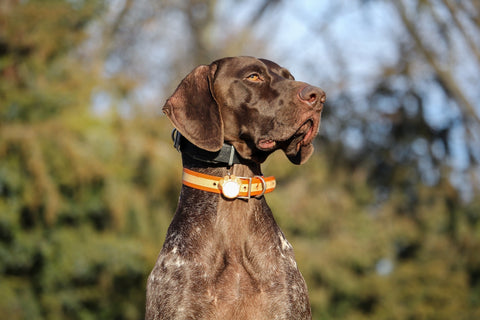 Temperament: These high-energy dogs love to play, hunt, and swim, and generally require ample active time every day. Ideally, a boisterous GSP dog should have access to plenty of outdoor space to allow for running, fetching, and exploring.
Temperament: These high-energy dogs love to play, hunt, and swim, and generally require ample active time every day. Ideally, a boisterous GSP dog should have access to plenty of outdoor space to allow for running, fetching, and exploring.
An important note about high-energy and highly intelligent dogs regards their potential for undesirable behavior such as destroying shoes or getting into the trash. This is often a result of pent-up energy due to insufficient exercise. To help avoid this, it is recommended to ensure your GSP gets plenty of exercise and playtime and has engaging toys to keep their mind active when inside or alone.
Personality: GSPs are generally very friendly to new humans and other dogs, though they can be standoffish if they feel unsure about a situation, owing to their guardianship instincts. They are known to be good with children, but they may need some time to feel comfortable around a child. All children should be taught how to interact with and respect animals before being introduced to any pet.
Ideal Owner: You! A German Pointer will look to you for guidance and comfort, so you can rely on them for loyalty and companionship. They might keep you on your toes, but they’ll be ready for snuggles on the couch before you know it.
Fur Care
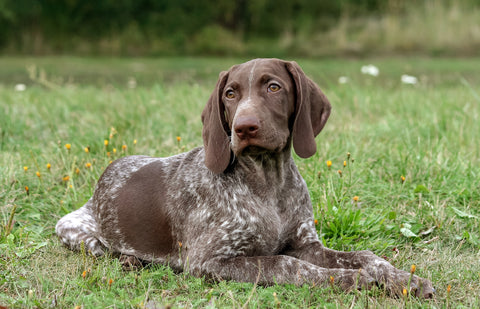
Grooming: German Shorthaired Pointer dogs have short fur, believe it or not, which is relatively easy to groom. Regular brushing and bathing are a great way to keep your dog clean, their skin healthy, and body odors at bay. Our German Shorthaired Pointer Aloe and Oatmeal Shampoo is a great option for a cleansing bath that won’t strip the coat of natural oils.
For Shorthaired pets, a grooming wipe can go a long way; in between baths or after outdoor play, a quick rub-down with our German Shorthaired Pointer Grooming Wipes helps remove dirt, debris, and oils from the coat with no mess, no bath, and no stress.
Shedding: Shorthaired canines are known as low-shedding breeds, but GSPs are not hypoallergenic due to their shedding of both fur and dander. Regular brushing can help remove dead skin and loose fur before it ends up on your carpet.
More to Know: A German Shorthaired Pointer’s toes are webbed for efficient swimming, and their acute hunting instincts make them excellent hunters of waterfowl.
Health
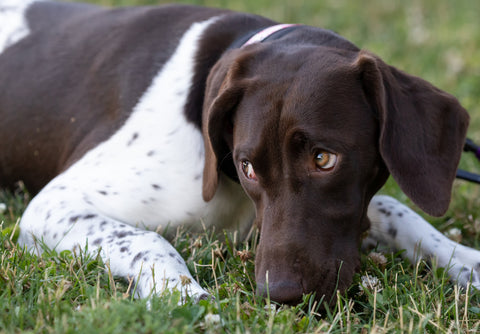
Common Issues: German Shorthaired Pointers are generally hearty and healthy dogs, but due to breeding practices, they are genetically predisposed to a few health problems.
Hip dysplasia is common among many breeds, and this joint condition can be caught and addressed early with regular veterinarian visits. Early signs may be easy to spot if you keep a watchful eye on your dog’s mobility, especially as they age. To help maintain their joint health at all stages of their life, veterinarians recommend supplementation with tablets or chews such as our German Shorthaired Pointer Z-Flex Max Hip and Joint Support Soft Chews to replenish nutrients essential to joint structure.
One common health concern for all dogs is Bloat, formally known as Gastric Dilation Volvulus (GDV), a condition involving trapped air in the stomach that can be serious and life-threatening. It is often caused by eating too much too fast, exercising too soon after eating, or drinking large amounts of water after eating dry food. Be sure to monitor your pet’s eating habits and use a food-hiding receptacle such as a snuffle mat to encourage slower eating.
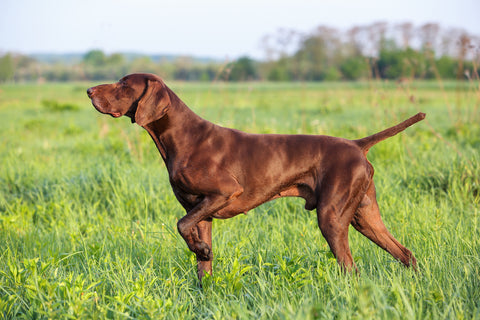 Less common inherited health conditions for GSPs include hypothyroidism, epilepsy, skin disorders, and ocular concerns. Most standard veterinarian evaluations check for warning signs of many health issues, so regular vet visits are essential, and even more so after age seven.
Less common inherited health conditions for GSPs include hypothyroidism, epilepsy, skin disorders, and ocular concerns. Most standard veterinarian evaluations check for warning signs of many health issues, so regular vet visits are essential, and even more so after age seven.
Similar to many breeds with longer ears, GSPs’ ears need to be cleaned and checked regularly or weekly to help prevent moisture and wax buildup, infections, and other otic issues.
German Shorthaired Pointer life expectancy can range from twelve to fourteen years.
Nutrition: Just like you, your Pointer needs a healthy, balanced diet. Canines require plenty of proteins from sources such as chicken, beef, pork, and poultry, which also supply essential amino acids. Aminos are responsible for rebuilding tissues all over the body and are crucial parts of any wholesome diet.
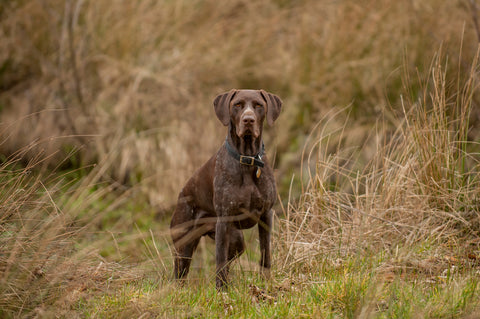 It can be easy to overfeed a dog, especially if they beg at the dinner table. However, dogs should not be fed table scraps, and their food intake should be monitored to avoid weight gain or obesity. A dog’s weight can contribute to their risk of the aforementioned congenital conditions, but it is also the most avoidable risk factor for your pet’s health.
It can be easy to overfeed a dog, especially if they beg at the dinner table. However, dogs should not be fed table scraps, and their food intake should be monitored to avoid weight gain or obesity. A dog’s weight can contribute to their risk of the aforementioned congenital conditions, but it is also the most avoidable risk factor for your pet’s health.
When it comes to what your dog should eat, veterinarians generally agree that even the best commercial pet foods are insufficient to maintain nutritional needs. Many pet foods are high in protein but low in vitamins and minerals. To fill this gap, vets recommend a canine multivitamin such as our Daily Multi-Tabs to replenish missing nutrients and fulfill their needs.
Lifespan: 12-14 years
Physical Activity
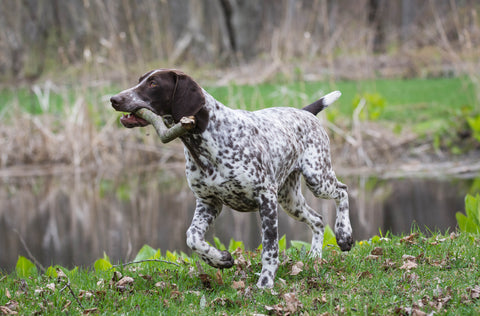 Training: Professional training is key for all dogs to maintain a calm, confident demeanor. German Shorthaired Pointers are known to be a bit bold but still trainable with a little time and patience. Once a dog is trained to follow your lead, they can feel more comfortable in your presence and may be less likely to react to stimuli in an undesirable way.
Training: Professional training is key for all dogs to maintain a calm, confident demeanor. German Shorthaired Pointers are known to be a bit bold but still trainable with a little time and patience. Once a dog is trained to follow your lead, they can feel more comfortable in your presence and may be less likely to react to stimuli in an undesirable way.
Obedience training is essential for hunting dogs, so be sure to seek a professional’s help before taking your dog out on the prairie. They may be eager to catch prey and bring it to their owner, but without proper training, they may ignore direct commands and get into trouble.
Exercise: GSPs are high-energy canines, meaning they need plenty of exercise every day—more than you may expect. It is recommended to plan for two long play sessions, ideally outside, to keep your Pointer happy. Engaging toys such as treat hiders and automatic ball-throwers are a great option if your dog needs more mental stimulation.
German Pointers love to run and swim, but one of their favorite activities is exploring. When your dog sniffs around the backyard or turns their nose to the wind, they are familiarizing themselves with their surroundings. This can be enriching and help them feel more comfortable in their environment, so owners should encourage their GSP to explore, sniff, and gaze all around their indoor and outdoor areas.
One often overlooked part of a canine exercise routine is paw care. Especially if your pup plays on hard ground, in very hot or very cold weather, or with intense vigor, their paws can take a beating. Our Paw Balm is an on-the-go paw care option to help replenish moisture and protect the delicate skin on and around the paws. We also recommend our Nose Balm for keeping skin hydrated in the dry, winter months and after playing in water which can dry out the nose.

German Shorthaired Pointers are outstanding companions, with big hearts and plenty of energy. Adding a GSP to your home is a big responsibility, but the rewards are well worth it.

